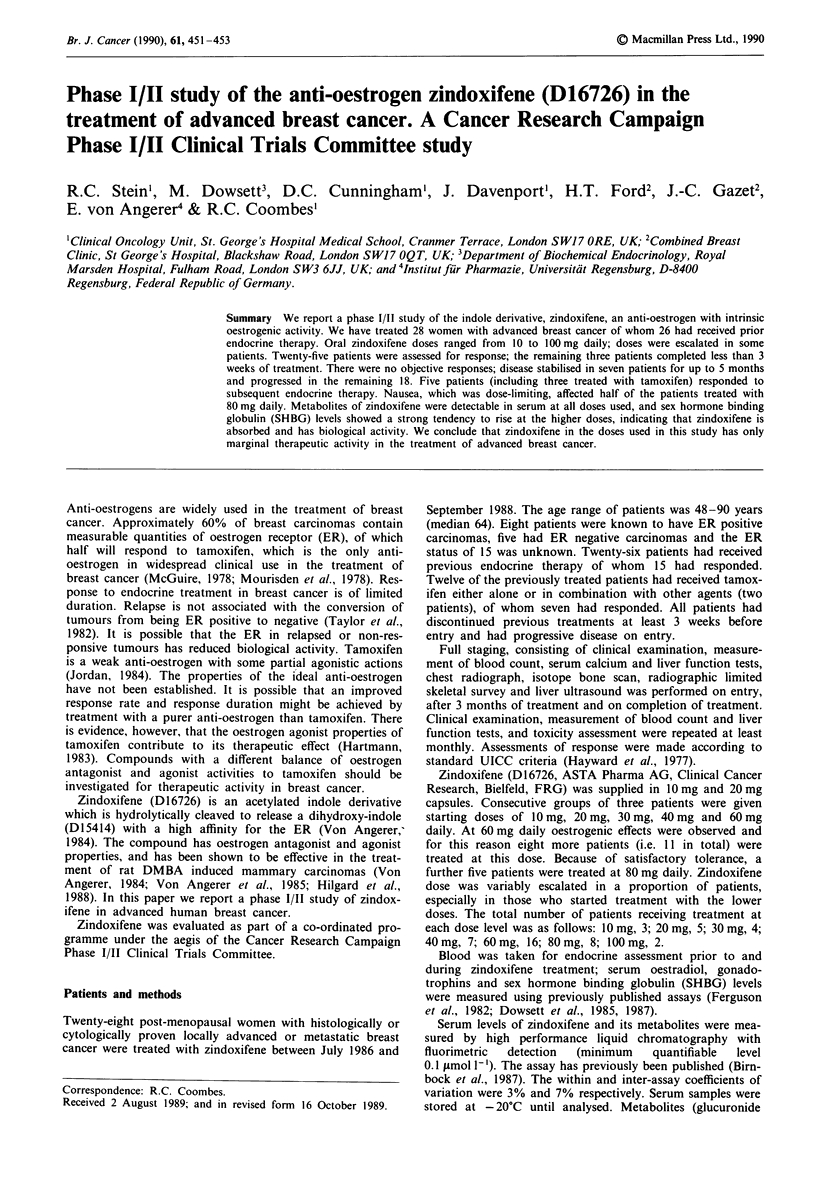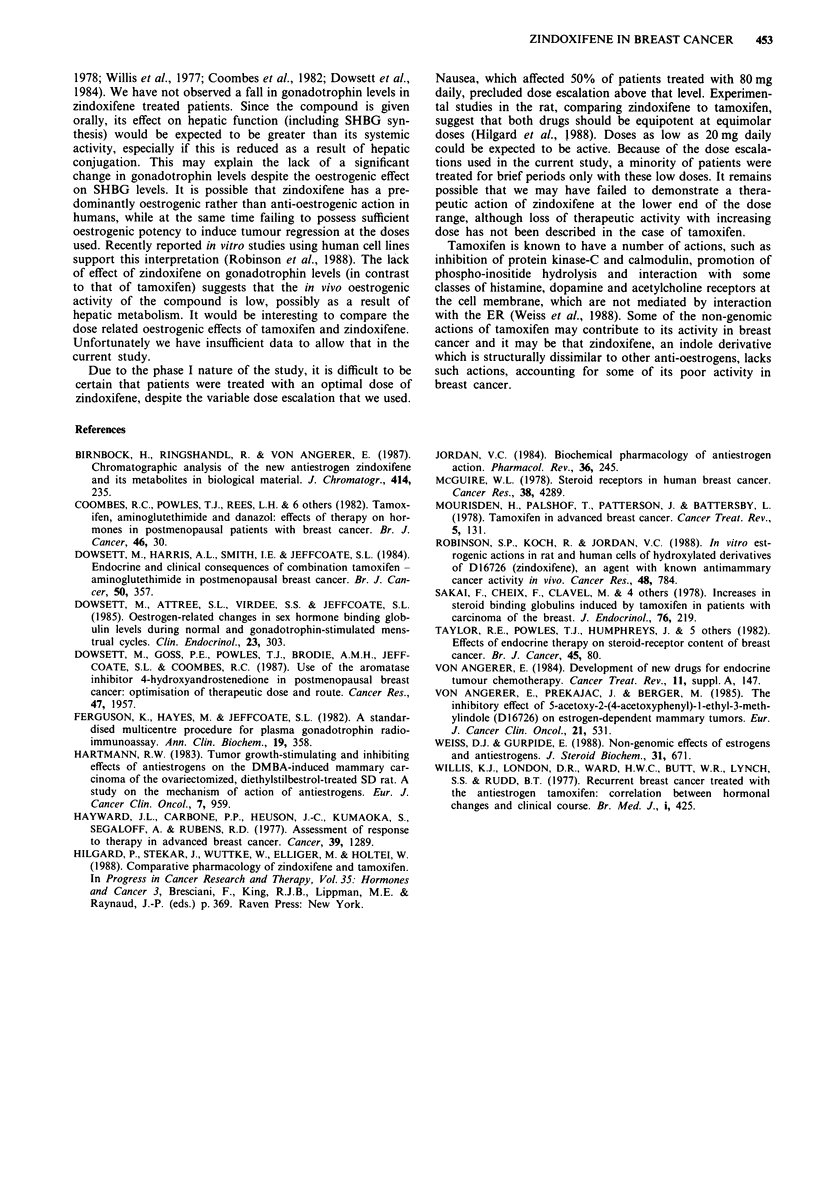Abstract
We report a phase I/II study of the indole derivative, zindoxifene, an anti-oestrogen with intrinsic oestrogenic activity. We have treated 28 women with advanced breast cancer of whom 26 had received prior endocrine therapy. Oral zindoxifene doses ranged from 10 to 100 mg daily; doses were escalated in some patients. Twenty-five patients were assessed for response; the remaining three patients completed less than 3 weeks of treatment. There were no objective responses; disease stabilised in seven patients for up to 5 months and progressed in the remaining 18. Five patients (including three treated with tamoxifen) responded to subsequent endocrine therapy. Nausea, which was dose-limiting, affected half of the patients treated with 80 mg daily. Metabolites of zindoxifene were detectable in serum at all doses used, and sex hormone binding globulin (SHBG) levels showed a strong tendency to rise at the higher doses, indicating that zindoxifene is absorbed and has biological activity. We conclude that zindoxifene in the doses used in this study has only marginal therapeutic activity in the treatment of advanced breast cancer.
Full text
PDF


Selected References
These references are in PubMed. This may not be the complete list of references from this article.
- Birnböck H., Ringshandl R., von Angerer E. Chromatographic analysis of the new antiestrogen zindoxifene and its metabolites in biological material. J Chromatogr. 1987 Feb 20;414(1):235–241. doi: 10.1016/0378-4347(87)80047-6. [DOI] [PubMed] [Google Scholar]
- Dowsett M., Attree S. L., Virdee S. S., Jeffcoate S. L. Oestrogen-related changes in sex hormone binding globulin levels during normal and gonadotrophin-stimulated menstrual cycles. Clin Endocrinol (Oxf) 1985 Sep;23(3):303–312. doi: 10.1111/j.1365-2265.1985.tb00228.x. [DOI] [PubMed] [Google Scholar]
- Dowsett M., Goss P. E., Powles T. J., Hutchinson G., Brodie A. M., Jeffcoate S. L., Coombes R. C. Use of the aromatase inhibitor 4-hydroxyandrostenedione in postmenopausal breast cancer: optimization of therapeutic dose and route. Cancer Res. 1987 Apr 1;47(7):1957–1961. [PubMed] [Google Scholar]
- Dowsett M., Harris A. L., Smith I. E., Jeffcoate S. L. Endocrine and clinical consequences of combination tamoxifen-aminoglutethimide in postmenopausal breast cancer. Br J Cancer. 1984 Sep;50(3):357–361. doi: 10.1038/bjc.1984.183. [DOI] [PMC free article] [PubMed] [Google Scholar]
- Ferguson K. M., Hayes M., Jeffcoate S. L. A standardised multicentre procedure for plasma gonadotrophin radioimmunoassay. Ann Clin Biochem. 1982 Sep;19(Pt 5):358–361. doi: 10.1177/000456328201900507. [DOI] [PubMed] [Google Scholar]
- Hartmann R. W. Tumor growth-stimulating and inhibiting effects of antiestrogens on the DMBA-induced mammary carcinoma of the ovariectomized, diethylstilbestrol-treated SD rat. A study on the mechanism of action of antiestrogens. Eur J Cancer Clin Oncol. 1983 Jul;19(7):959–964. doi: 10.1016/0277-5379(83)90065-2. [DOI] [PubMed] [Google Scholar]
- Hayward J. L., Carbone P. P., Heuson J. C., Kumaoka S., Segaloff A., Rubens R. D. Assessment of response to therapy in advanced breast cancer: a project of the Programme on Clinical Oncology of the International Union Against Cancer, Geneva, Switzerland. Cancer. 1977 Mar;39(3):1289–1294. doi: 10.1002/1097-0142(197703)39:3<1289::aid-cncr2820390340>3.0.co;2-f. [DOI] [PubMed] [Google Scholar]
- Jordan V. C. Biochemical pharmacology of antiestrogen action. Pharmacol Rev. 1984 Dec;36(4):245–276. [PubMed] [Google Scholar]
- McGuire W. L. Steroid receptors in human breast cancer. Cancer Res. 1978 Nov;38(11 Pt 2):4289–4291. [PubMed] [Google Scholar]
- Mouridsen H., Palshof T., Patterson J., Battersby L. Tamoxifen in advanced breast cancer. Cancer Treat Rev. 1978 Sep;5(3):131–141. doi: 10.1016/s0305-7372(78)80017-6. [DOI] [PubMed] [Google Scholar]
- Robinson S. P., Koch R., Jordan V. C. In vitro estrogenic actions in rat and human cells of hydroxylated derivatives of D16726 (zindoxifene), an agent with known antimammary cancer activity in vivo. Cancer Res. 1988 Feb 15;48(4):784–787. [PubMed] [Google Scholar]
- Sakai F., Cheix F., Clavel M., Colon J., Mayer M., Pommatau E., Saez S. Increases in steroid binding globulins induced by tamoxifen in patients with carcinoma of the breast. J Endocrinol. 1978 Feb;76(2):219–226. doi: 10.1677/joe.0.0760219. [DOI] [PubMed] [Google Scholar]
- Weiss D. J., Gurpide E. Non-genomic effects of estrogens and antiestrogens. J Steroid Biochem. 1988 Oct;31(4B):671–676. doi: 10.1016/0022-4731(88)90017-9. [DOI] [PubMed] [Google Scholar]
- Willis K. J., London D. R., Ward H. W., Butt W. R., Lynch S. S., Rudd B. T. Recurrent breast cancer treated with the antioestrogen tamoxifen: correlation between hormonal changes and clinical course. Br Med J. 1977 Feb 12;1(6058):425–428. doi: 10.1136/bmj.1.6058.425. [DOI] [PMC free article] [PubMed] [Google Scholar]
- von Angerer E. Development of new drugs for endocrine tumour chemotherapy. Cancer Treat Rev. 1984 Mar;11 (Suppl A):147–153. doi: 10.1016/0305-7372(84)90054-9. [DOI] [PubMed] [Google Scholar]
- von Angerer E., Prekajac J., Berger M. The inhibitory effect of 5-acetoxy-2-(4-acetoxyphenyl)-1-ethyl-3-methylindole (D 16726) on estrogen-dependent mammary tumors. Eur J Cancer Clin Oncol. 1985 Apr;21(4):531–537. doi: 10.1016/0277-5379(85)90048-3. [DOI] [PubMed] [Google Scholar]


